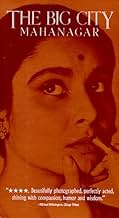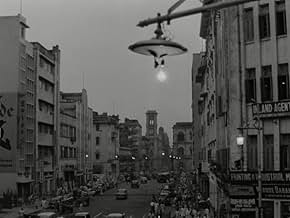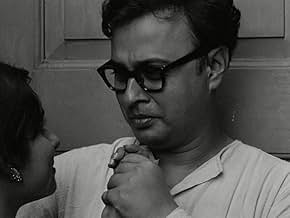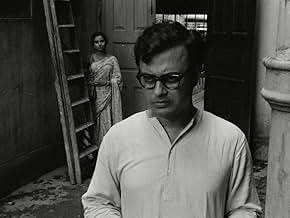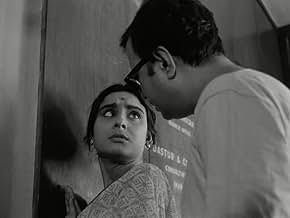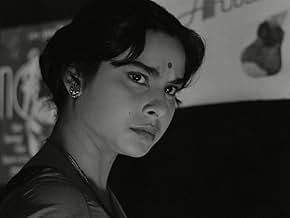Füge eine Handlung in deiner Sprache hinzuLife at home changes when a house-wife from a middle-class, conservative family in Calcutta gets a job as a saleswoman.Life at home changes when a house-wife from a middle-class, conservative family in Calcutta gets a job as a saleswoman.Life at home changes when a house-wife from a middle-class, conservative family in Calcutta gets a job as a saleswoman.
- Regie
- Drehbuch
- Hauptbesetzung
- Auszeichnungen
- 4 Gewinne & 1 Nominierung insgesamt
- Arati Mazumder
- (as Madhabi Mukherjee)
- Bani
- (as Jaya Bhaduri)
- Sarojini (Subrata's Mother)
- (as Shephalika Devi)
- Himangshu Mukherjee
- (as Haradhan Banerjee)
Empfohlene Bewertungen
After having finished watching Mahanagar, I felt that the lonely house wife I had seen earlier had achieved a sense of fulfillment..a sense of completion.The entire film is a microcosm of an typical urbane family of the 1960's Calcutta. The legendary city of Calcutta in the 1960's has been impressionistic-ally captured with all its charm as well as confusion.We can see some of the best well-scripted, realistic emotional sequences. An young Jayabhaduri too appears as the little sister of Mr. Mazumdar(The main character's husband). Madhabi Mukherjee again dons a intense character and proves her brilliance in acting.Now I have become impatient enough to watch Ray's Calcutta Trilogy and other films too.It is very difficult to get good prints of most of them.
Ray had based this film on Abataranika, a Bengali short story. All the actors have been handpicked-especially Anil Chatterjee and Haren Chatterjee-who played the role of Mr. Mazumdar and his father.The film was well-received at the 14th Berlin Festival and Ray won a Silver Bear for direction. Even though it was rejected at the Oscars, it received an All India merit certificate at the National awards that year.
The story follows Arati's acclimation with her job as a sales woman, her growing independence, and her new relationships with people from different social and financial classes, one example being a young Anglo-Indian colleague named Edith whom she befriends. The real conflict, however, does not happen when Arati's in-laws start a silent "cold war", but when her husband himself loses his own job and Arati becomes the sole breadwinner of the family. Subrata loses self-respect and is filled with negative feelings of inferiority and shame.
This is the story of Satyajit Ray's extraordinary classic 'Mahanagar', a poignant, quiet and moving picture which depicts a whole world of conflicts resulting from modernisation and changing social and generational norms. Ray's portrayal of the urban India, its lifestyle and people, is brilliantly done. Everything about the film is, as expected, very authentic, very real and very easily identifiable with Ray's style of film-making. He makes the proceedings and the characters very interesting and very easy to relate to.
The film deals with the struggle of middle-class families to survive in the big city through their everyday hardships, but in the process, shows the gender role conflicts and criticises the hypocrisy of traditional conservativeness. One such instance is shown when Arati's father-in-law, a retired teacher who had complained that he was in need of a new pair of spectacles, now prefers going and begging from his former student rather than accepting money from his working daughter-in-law who 'breaks tradition'.
The relationships in Mahanagar are perfectly portrayed, whether it's Arati's relationship with her husband, with her kid, with her in-laws, with her employer. But the best thing about it is the portrayal of Arati's acquaintance with her new self. Her job provides her with confidence and self-belief as she grows increasingly independent, both socially and economically. Mainly due to her friendship with the Anglo-Indian Edith, who she would later stand up for, Arati learns to use lipsticks, wear dark fashionable glasses, speak more assertively and stand up against injustice, while still maintaining her individuality as a simple, unselfish woman.
Madhabi Mukherjee is astonishing as Arati. She is a natural beauty, and acts with grace and dignity. She convincingly transforms from a simple housewife into a modern and smart woman of substance, always letting the viewer sense her struggle, confusion and pain. Anil Chatterjee is great as the slightly embittered yet loving husband. Jaya Bhaduri is completely lovable and charming in her debut role. Prasenjit Sarkar is cute as a button as Pintu. Vicky Redwood is quite nice though her line delivery is often weak. Haradhan Bannerjee is very sympathetic as Arati's boss though his character is slightly prejudiced.
Mahanagar is another example of Ray's indelible craftsmanship, of his superb storytelling and his exceptional ability to tell a universal story which is both moving and educative in a simple yet very effective way. The film's pace may be a bit slow, but it is steady enough, and the picture remains thoroughly and consistently engaging and captivating. The ending is bittersweet - sad yet optimistic, satisfying and inspiring. Mahanagar is overall a beautiful social drama; a classic and fascinating piece which is highly recommended.
We see all sorts of manifestations of duality in Mahanagar. The tension-cum-rivalry of Arati and Subrata is, of course, the most obvious manifestation. However, we also have the duality of the new- generation Arati/Subrata and the old-generation Sarojini/Priyogopal (Subrata's mother and father) and Arati, who wears traditional clothing and speaks Bengali, versus Edith, the English-speaking Anglo-Indian in Western dress. These instances of duality speak directly to the moment in which things began to make a 180-degree shift in India, when women became the breadwinners of the household and traditional gender norms became subsumed by sexual liberation.
With a leading lady as precise as Mukherjee, Ray was able wrap these complex coterminous processes up in a relatively tidy package. Mahanagar is essential viewing.
Satyajit Ray, in Mahanagar, made a movie where ( in terms of cinematography and story-telling) not a single frame is wasted in anyway. Every movement of the actors, every hint relates to something or the other, while the story-telling is still simple enough for the ordinary to follow the story. I would recommend this to anyone.
Subrata's father is a retired school teacher whose pupils have gone on to considerable success as doctors, lawyers, and businessmen while he has slid further into poverty. When the aging patriarch is in need of new eyeglasses, he turns to one of his former pupils to help him out. After Subrata casually mentions that a friend's wife has gone to work, Arati gets the idea of supplementing the family's meager income by getting a job herself but this idea is looked on with disdain by the traditionally-minded family. A "cold war" prevails in the household as Arati takes a job selling sewing machines in affluent neighborhoods, enrolling the woman of the house who is always at home.
After several abortive attempts in which she backs off after hearing the sound of a guard dog, Arati settles into her job and begins to thrive, gaining increased self-confidence and inner strength. Even young Pintu is mollified when his mother brings him home some toys after getting paid. Influenced by co-worker Edith (Vicky Redwood), an Anglo-Indian, Arati begins to wear lipstick and sunglasses and is more assertive with her boss (Haradhan Bannerjee) but her husband is resentful and complains that he doesn't know her anymore. Although Edith persuades her boss to grant the workers a commission on sales, he seems to resent her Westernized manner and feels more comfortable with Arati whom he offers a promotion.
Due to a run on the bank in which he is an employee, Subrata is laid off and this causes additional stresses and strains in the family but their love for each other transcends economics and allows Arati to stand up to her boss on a matter of principle. The Big City is not as sweeping in scope or as in-depth a character study as some of Ray's more well-known films, but it is an honest and compelling portrait of a young woman's discovery of herself with strong performances by Mr. Chatterjee and especially Ms. Mukherjee, who would go on to star in one of Ray's most acclaimed films, Charulata.
Wusstest du schon
- WissenswertesFifteen-year old Jaya Bhaduri's (later known as Jaya Bachchan) film debut and her only film with Satyajit Ray.
- PatzerWhen Priyogopal (Subrata's father) goes to visit his student Anupam Roychowdhury to ask for money he is shown having a conversation with Anupam in his office. When he is explaining his circumstance the camera shows him only sitting on a chair with his walking stick. In the very next scene when all the three characters are shown (third one being Anupam's wife ) the top of his walking stick has changed direction. The round bit on top was towards the right before and is turned to the left in the very next scene.
- Zitate
Arati: You wouldn't recognize me on the job.
Subrata Mazumdar: What about at home? Would I recognize you at home?
Arati: You don't recognize me? Tell me honestly.
[Subrata shakes his head no]
Arati: Why not?
Subrata Mazumdar: It all feels a bit unfamiliar. It feels a bit...
Arati: What about this?
[points at her cheek]
Arati: You don't recognize my mole? I'm still the same housewife.
- VerbindungenReferenced in Creative Artists of India: Satyajit Ray (1964)
Top-Auswahl
- How long is The Big City?Powered by Alexa
Details
- Erscheinungsdatum
- Herkunftsland
- Offizieller Standort
- Sprachen
- Auch bekannt als
- The Big City
- Drehorte
- RN Mukherjee Rd, Kalkutta, Westbengalen, Indien(closing shot: view of the city)
- Produktionsfirma
- Weitere beteiligte Unternehmen bei IMDbPro anzeigen
- Laufzeit
- 2 Std. 16 Min.(136 min)
- Farbe
- Sound-Mix
- Seitenverhältnis
- 1.37 : 1


